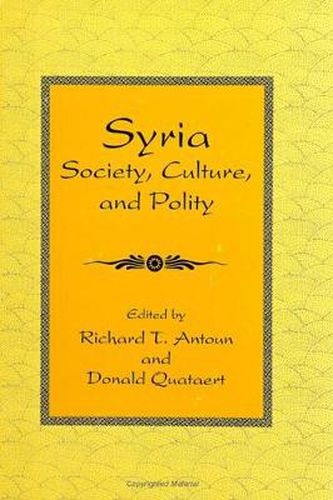Readings Newsletter
Become a Readings Member to make your shopping experience even easier.
Sign in or sign up for free!
You’re not far away from qualifying for FREE standard shipping within Australia
You’ve qualified for FREE standard shipping within Australia
The cart is loading…






This book provides a multi-disciplinary understanding of the processes of change in contemporary Syria as well as its historical, social, and cultural underpinnings. A number of distinguished anthropologists, historians, political scientists, and literateurs examine key issues such as the changing Syrian family, political factionalism, the sedentarization of nomads, bureaucratic corruption, rural-urban migration, the development of the Ba'th Party, Syria’s political isolation, religious resurgence, and the continued importance of sects in Syrian life. This book strikes a balance between examining the consequences of Syria’s geographical and strategic position in international politics and the implications of its internal and highly complex ethnic and class structure and culture. It argues that the religious culture of Syria is as important as the leadership of Asad and, more generally, that an understanding of Syrian politics must be matched by an understanding of Syrian society and culture.
$9.00 standard shipping within Australia
FREE standard shipping within Australia for orders over $100.00
Express & International shipping calculated at checkout
This book provides a multi-disciplinary understanding of the processes of change in contemporary Syria as well as its historical, social, and cultural underpinnings. A number of distinguished anthropologists, historians, political scientists, and literateurs examine key issues such as the changing Syrian family, political factionalism, the sedentarization of nomads, bureaucratic corruption, rural-urban migration, the development of the Ba'th Party, Syria’s political isolation, religious resurgence, and the continued importance of sects in Syrian life. This book strikes a balance between examining the consequences of Syria’s geographical and strategic position in international politics and the implications of its internal and highly complex ethnic and class structure and culture. It argues that the religious culture of Syria is as important as the leadership of Asad and, more generally, that an understanding of Syrian politics must be matched by an understanding of Syrian society and culture.